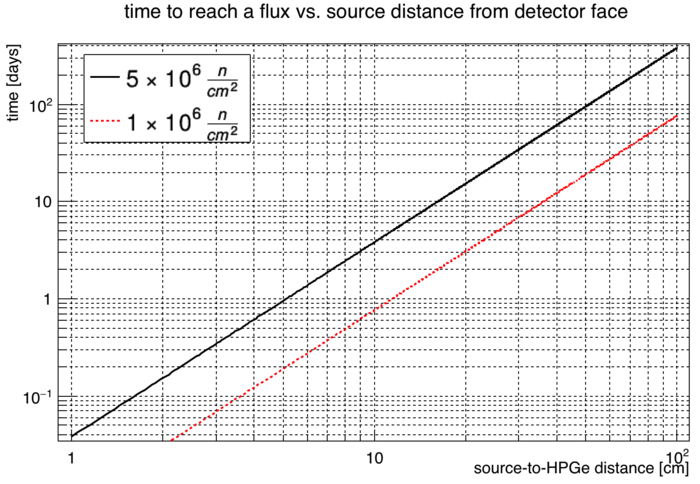Difference between revisions of "Fast neutron damage to HPGe Detector"
| Line 1: | Line 1: | ||
| − | An observable decrease in the energy resolution of large HPGe detectors was first seen after the irradiation of 5*10^7 n/cm^2<ref>P. H. Stelson, J. K. Dickens, S. Raman, and R. C. Trammell, “Deterioration of Large Ge(Li) Diodes Caused by Fast Neutrons,” Nuclear Instruments and Methods 98,481 (1972).</ref> | + | An observable decrease in the energy resolution of large HPGe detectors was first seen after the irradiation of 5*10^7 n/cm^2<ref>P. H. Stelson, J. K. Dickens, S. Raman, and R. C. Trammell, “Deterioration of Large Ge(Li) Diodes Caused by Fast Neutrons,” Nuclear Instruments and Methods 98,481 (1972).</ref>. I choose a factor of ten below that value to be the maximum allowable neutron irradiation. |
| − | The maximum neutron flux | + | The maximum neutron flux from a point source will occur exactly at the center of the detector face, where the expression for integral flux over a period <math>\Delta t</math>is simply: <math>\Delta t\times n_{rate}\frac{1}{4\pi d^2}</math>, where <math>n_{rate}</math> is the neutron rate of the source. |
| − | The number of days it would take to reach an integral flux of 5*10^6 n/cm^2, as a function of the distance from source to HPGe face is shown below. The graph assumes the activity of the Cf-252 source as of 01/2017, which | + | The number of days it would take to reach an integral flux of 5*10^6 n/cm^2, as a function of the distance from source to HPGe face is shown below. The graph assumes the activity of the Cf-252 source as of 01/2017, which was 19,066 <math>\pm</math> 300 n/s (see [[Cf-252 FTC-CFZ-431| here]] for discussion of source rates). |
| + | |||
[[File:MaxHPGeCF252Time.png|700px]] | [[File:MaxHPGeCF252Time.png|700px]] | ||
Revision as of 09:07, 29 December 2016
An observable decrease in the energy resolution of large HPGe detectors was first seen after the irradiation of 5*10^7 n/cm^2<ref>P. H. Stelson, J. K. Dickens, S. Raman, and R. C. Trammell, “Deterioration of Large Ge(Li) Diodes Caused by Fast Neutrons,” Nuclear Instruments and Methods 98,481 (1972).</ref>. I choose a factor of ten below that value to be the maximum allowable neutron irradiation.
The maximum neutron flux from a point source will occur exactly at the center of the detector face, where the expression for integral flux over a period is simply: , where is the neutron rate of the source.
The number of days it would take to reach an integral flux of 5*10^6 n/cm^2, as a function of the distance from source to HPGe face is shown below. The graph assumes the activity of the Cf-252 source as of 01/2017, which was 19,066 300 n/s (see here for discussion of source rates).
- The formula used in the graph above is,
References
<references />
